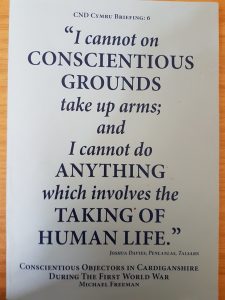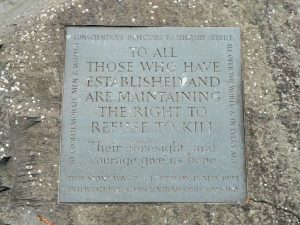By Donggeun Lee, RightsViews Staff Writer and a junior majoring in Human Rights.
When one serves their nation against their will, who would be responsible for the trauma that they might receive? Some might join the military to avoid social pressure or jail, believing that military service will not be too bad. The problem is that it could be. Surely, hazing in the military is one source of trauma, but there are more. The trauma that roots in the memory of those serving the nation. Throughout history, the military forces, at times, were used in crimes, such as genocide. Not only the Nazi-led holocaust, but also the Armenian Genocide, Irish Genocide, and even the Turkish army invading the Kurdish region in 2019 were all done by use of military forces. Those who serve the nation believing that they were protecting national security may later find out that they were actually involved in mass-killing with no moral reasons. They could have tremendous post-trauma that may stay for life. When conscientious objection is not legal, those who are drafted have to endure the possibility of suffering. For these reasons, there are many different types of conscientious objectors (e.g. one may agree to military service but not a specific war). It is critical that we understand the differences and necessities of conscientious objections.
In 2018, the Constitutional Court of South Korea ruled that criminalizing conscientious objection was unconstitutional. The ruling was based on the right to conscience, stated as “all citizens shall enjoy freedom of conscience” in Article 19 of the Korean Constitution. Precisely, some articles of the military service act that did not provide alternative ways to serve for conscientious objectors – those who refuse to perform military service on the basis of moral or religious principles – were ruled as unconstitutional. Minority opinions claiming it was constitutional were fourfold: first, it could be solved by legislative amendments and courts’ subsequent rulings. Second, the threatened personal rights were not universal, nor was it more important than the public interest, national security. Thirdly, the article of military service act criminalizing all non-compliance to military service should also be ruled unconstitutional. Finally, the legal basis of this case is not about the constitutionality of the law, but the interpretation of the law; therefore, it does not meet the requirements to be brought to the Constitutional Court. Two articles from the Korean constitution were mentioned in the case, the 19th and 2nd sub-article of the 37th:
“Article 19: All citizens shall enjoy freedom of conscience.
Article 37: (1) Freedoms and rights of citizens shall not be neglected on the grounds that they are not enumerated in the Constitution.
(2) The freedoms and rights of citizens may be restricted by Act only when necessary for national security, the maintenance of law and order or for public welfare. Even when such restriction is imposed, no essential aspect of the freedom or rights hall be violated”
However, on the international level, this is a controversial subject among nations. The Human Rights Committee (HRC) stated in 1993 that it believes a conscientious objection is a human right. Later, in 2006, HRC elaborated its position regarding the issue when examining the State parties’ reports, which were Koreans v. Republic of Korea. Article 19 of the Universal Declaration of Human Rights is worth discussion as the HRC rooted their opinion on conscientious objectors’ violation of rights from this article:
“Everyone has the right to freedom of opinion and expression; this right includes freedom to hold opinions without interference and to seek, receive and impart information and ideas through any media and regardless of frontiers.”
The conscientious objectors’ rights, then, have been recognized by governments and international organizations, but because of the lack of states’ voluntary actions to change their policies or laws, such rights had not been protected worldwide.
Globally, these objectors’ rights were not protected until recent years. The European Court of Human Rights has recognized conscientious objection to be the right of a person in 2011. The European Court of Human Rights focused on Article 9 of the European Convention on Human Rights:
“1. Everyone has the right to freedom of thought, conscience, and religion; this right includes freedom to change his religion or belief and freedom, either alone or in community with others and in public or private, to manifest his religion or belief, in worship, teaching, practice and observance.
2. Freedom to manifest one’s religion or beliefs shall be subject only to such limitations as are prescribed by law and are necessary in a democratic society in the interests of public safety, for the protection of public order, health or morals, or for the protection of the rights and freedoms of others.”
The court’s ruling was regarding the protection of one’s religious belief. However, by 2011, most European Union countries had already changed their policies to a voluntary military system, leaving only Turkey and Azerbaijan with compulsory military systems; It was easier for the court to make such a ruling. (Temperman et al., 2019)
The European Convention on Human Rights was signed in 1950 and took effect in 1953. The Korean constitution was most recently amended on October 29, 1987. What must also be noted is that this was not the only or first case of conscientious objectors in history; there were many others, and all cases were dismissed as national security was valued more. Documents and treaties that state human rights are the legal basis of rights of conscientious objectors were created almost a half a century ago. Thus, it is clear that such human rights normative documents and institutions have failed to protect the rights of conscientious objectors. What has an impact on one’s rights is the public awareness of these rights and the changes in the interpretations of human rights norms.
Other questions regarding the nature of the compulsory draft system are crucial. Most people that are drafted and forced to serve in military or alternative service are those who just became young adults. These individuals have had limited access to participate in political change, yet they are still drafted. Drafting young people into military service or placing them in jail, either as punishment or service: does it do more harm than good for the future of a country?


